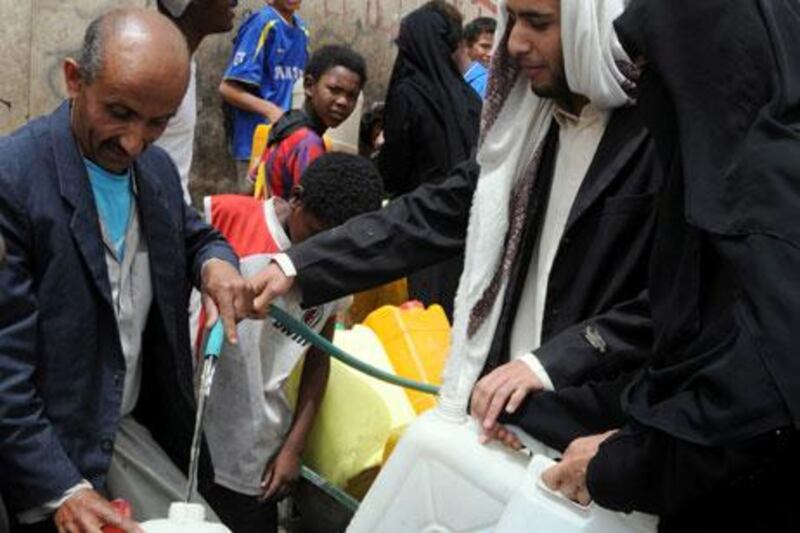SANAA // Buckets crowd the rooftops of homes in Sanaa, where families have begun to put more faith in prayer than in the government to end a growing water crisis.
"We lost hope in the government and are now seeking water from God. The buckets we fill will be enough for a week's use," said Ali Jawani, a resident of the Yemeni capital.
It has not rained for more than two months and the rainy season is coming to an end. Mr Jawani's hopes that the buckets will fill up are dwindling - just days before the holy month begins.
"I can't afford to buy water and Ramadan is in less than two weeks. How will my family fast and worship when living standards are unbearable?" he said.
Few Yemenis receive water from underground pipes,a testament to poor infrastructure. Most rely on lorries that deliver water stored in underground tanks.
Filling a 1,000-gallon water tank cost Dh22 in March. This week it neared Dh100. Most people live on less than Dh8 a day, so taps run dry and buckets are used for showers to save money for other needs.
Tanker drivers blame the price increases on rising fuel costs. Petrol is almost impossible to obtain at filling stations, and its price on the black market has increased sixfold since May.
Meanwhile, the price of bottled water in the shops has more than doubled in the past two weeks to Dh2 for a half-litre, forcing hundreds of thousands of families to drink, and cook with, contaminated water.
The government condemned the price rise but offered no real solution. Abdul Basit Kumaim, the general manager at the Ministry of Trade, said: "We will continue censuring and ensure that prices return to normal as soon as possible."
He said shopkeepers would face fines or imprisonment for profiteering, but there have been no arrests or fines.
Abdul Rahman Al Eryani, the water minister, resigned last month saying he did not have complete authority to fulfil his duties.
An aide to Mr Al Eryani said the minister alleged that the ruling family controlled water services and insisted on making people suffer for the five months of protests calling for the president, Ali Abdullah Saleh, to end his 33-year rule.
"The minister felt ashamed to stay in his post and decided to step down," the aide said.
Hasan Zaid, the secretary general of the opposition Haq party, also blamed Mr Saleh's ruling family for the water crisis.
At least 12 people were killed waiting for fuel in front of petrol stations, but hundreds, maybe thousands, would die in a food and water crisis, Mr Zaid said. "We can live without fuel or electricity but we can't live without food or water."
Water shortages are being reported primarily in the capital and Taiz. When the water crisis began in March, families went to mosques for water. Now, nearly all mosques are dry as well. Mosque caretakers have resorted to locking the bathroom doors, leaving only the prayer hall open.
Tawfeek Sabri, caretaker of a mosque in Sanaa, said: "The government stopped providing mosques with water and people are too poor to pay the cost of water tankers. The bathrooms were closed two weeks ago and we are not planning to open them any time soon."
That leaves many to rely on their community to get by. Salma Al Kaff has six children to feed. Her husband lost his job in construction five months ago.
Mrs Al Kaff's biggest worry now is water. "It's not easy knocking on neighbours' doors and asking them to fill a bucket of water for you. We do that to live."
Abdullah Musalim, 11, Mrs Al Salma's eldest son, made the rounds on Tuesday, going from door to door with a 10-litre bucket. He had to knock on six doors before his bucket was full.
"I can't knock on these houses again, only after two weeks. If we come often, they will reject us. Tomorrow I will get water from our other neighbours," Musalim said.
He will skip school this year to support his family. "I want to study but living is more important. I don't want my mother to worry about us."





